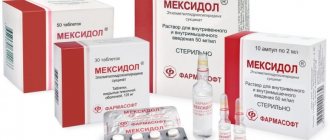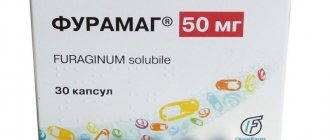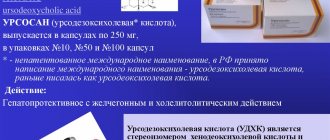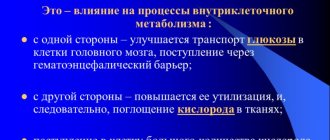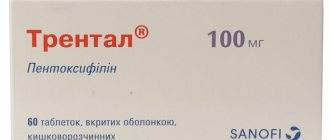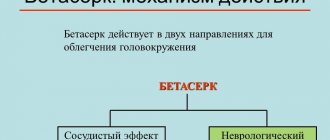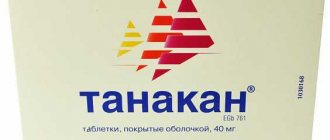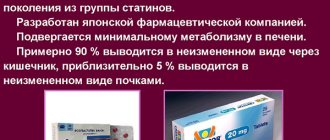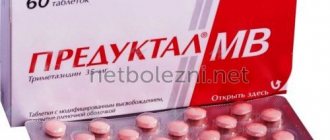Trental is a peripheral vasodilator. The medication is produced in solution for injections and in tablets based on the active ingredient - pentoxifylline. There are many structural analogues of Trental based on pentoxifylline on the pharmacological market.
Trental is used to treat the following disorders:
- encephalopathy of atherosclerotic origin;
- ischemic stroke;
- disruption of blood flow in peripheral arteries due to the development of systemic atherosclerosis;
- diabetic type angiopathy;
- ulcers of diabetic or atherosclerotic etiology;
- gangrene;
- Raynaud's syndrome
- varicose veins;
- improper blood flow in the eyes, which can cause inflammation of the optic nerve and organ failure;
- ear diseases.
Trental is not prescribed for the following reasons:
- allergy to the composition;
- excessive bleeding and predisposition to it;
- hemorrhagic stroke and hemorrhage in the eye;
- acute phase of myocardial infarction;
- ulcerative destruction in the digestive tract;
- hemorrhages.
The medicine is also not prescribed to pregnant women and during lactation. Adverse reactions from the use of Trental:
- neurological disorders - dizziness and pain in the head, irritability and anxiety, convulsions and tremors of the arms and legs, hallucinations and paresthesia, disturbance of sleep rhythm;
- dermatological reactions - urticaria and hyperemia of the epidermis, flushing of the face, swelling and fragility of the nail plate;
- reactions of the digestive tract - diarrhea, nausea and vomiting, cholecystitis, hepatitis;
- cardiac disorders - tachycardia and blood pressure fluctuations, edema in the periphery, arrhythmia and angina.
Popular Russian substitutes
Domestic substitutes for Trental have a fairly low cost with high efficiency.
Flexital
Flexital is an angioprotector that increases microcirculation in the bloodstream system. Used for blood flow disorders of various etiologies:
- diabetic type angiopathy;
- atherosclerotic genesis, impaired blood supply to the periphery;
- atherosclerotic encephalopathy;
- angioneuropathy and paresthesia;
- trophic ulcers, burns, frostbite;
- lack of blood flow to the eye;
- endarteritis;
- disturbance in the blood supply to the ear.
The medication should not be prescribed in the following cases:
- heavy bleeding;
- heart attack and cerebral hemorrhage;
- porphyria;
- childhood;
- allergy to medicine.
The Trental analogue is used with great caution in patients with the following concomitant pathologies:
- hypotension and cardiac pathologies associated with myocardial rhythm;
- atherosclerosis of the coronary and cerebral arteries;
- liver and kidney dysfunction;
- after surgical intervention in the body.
The medication is administered intravenously in a single dosage of 100 mg, diluted in 200-250 ml of sodium chloride. The frequency of IV procedures per day is 3. When prescribing tablets, the initial dosage is 600 mg per day, which is halved after the symptoms of the disease disappear. Frequency of administration per day – 3 times. Adverse reactions of Flexital are identical to the negative effects of Trental.
Dipyridamole
The drug dilates the coronary arterioles and increases the speed of blood movement through the system. Dipyridamole is prescribed in the following cases:
- thromboembolism and thrombosis;
- encephalopathy and cerebral ischemia;
- heart attack and ischemic stroke;
- transient attacks in the brain;
- placental insufficiency during pregnancy;
- hypertension and impaired blood supply to the periphery;
- influenza and ARVI;
- DIC syndrome in children;
- glomerulonephritis (as part of combination therapy).
It is prohibited to prescribe for:
- hypersensitivity;
- decompensated stage of CHF and acute infarction;
- hypotension and hemorrhage;
- ulcerative destruction in the gastrointestinal tract;
- arrhythmias;
- tachycardia and angina pectoris;
- pathologies of the liver and kidneys;
- less than 12 years of age and lactation.
For the treatment of coronary insufficiency - 25-50 mg three times a day, with severe development of the disease - 75 mg 3 times a day. Dosage per day – 100-200 mg. For children, the dosage per day is 5 mg per 1 kg of weight, distributed over 3-4 tablet-taking procedures. Obliterating pathologies of the extremities – 75 mg three times a day for 2-3 months.
When using the medicine, the following negative effects may occur:
- increased blood flow can cause redness of the skin and lower blood pressure;
- tachycardia, arrhythmia and bradycardia;
- epigastric pain and diarrhea;
- increased bleeding;
- dizziness, sleep disturbance and headache;
- arthritis, rhinitis, myalgia.
Adverse reactions
When the medicine is used correctly, adverse reactions of the body are rarely observed. As a rule, negative reactions occur when contraindications are violated, an overdose or non-compliance with the infusion rate.
The most common side effects occur from the nervous system. They may manifest as headaches. Negative reactions are also often associated with insomnia and internal anxiety.
Sometimes swelling and redness of the skin of the face may appear. In severe cases, an overdose develops tachycardia or arrhythmia, as well as other disruptions in the functioning of the cardiovascular system. Severe allergic reactions and signs of gastrointestinal bleeding may occur.
If dangerous symptoms appear and the general condition worsens, you should stop taking the drug. Treatment is symptomatic. If the patient’s condition cannot be stabilized, an ambulance should be called.
Generic tablets
There are generics of Trental in tablet form. This dosage form makes it easier to take the medication.
Chime
Curantil is a myotropic vasodilator that blocks platelet aggregation, which improves microcirculation in the cerebral arteries. The main component is dipyridamole, which has a vasodilating effect on the arterial membranes.
Curantil is used in the treatment of such diseases:
- disturbance of blood flow in the cerebral arteries due to the development of ischemia;
- encephalopathy;
- myocardial ischemia, with aspirin intolerance;
- thrombosis and thrombophlebitis;
- disturbance of peripheral blood flow;
- viral pathologies.
Also prescribed as a prophylaxis for thromboembolism after cardiac surgery and placental insufficiency. It is prohibited to use Curantil in therapy for these reasons:
- allergy to medication;
- acute form of heart attack;
- hemorrhagic type stroke;
- angina pectoris;
- atherosclerosis of the cerebral and coronary arteries;
- aortic stenosis;
- collapse;
- hypotension;
- chronic lung pathologies;
- hemorrhages;
- ulcerative destruction in the digestive tract;
- risks of bleeding.
The drug is prescribed to patients who are 12 years old at the time of treatment. Dosages and treatment regimen:
- the dosage is prescribed based on the pathology and the stage of its progression - 3-9 tablets per day;
- The daily dose should be divided into 3-4 doses.
The duration of the medication course is determined by the doctor personally for each patient.
Vazonite
Vazonite is produced in tablets with the main component – pentoxifylline. Tablets are prescribed for the following diseases:
- angioneuropathy;
- atherosclerotic and dyscirculatory encephalopathy;
- disturbance of blood flow in parts of the brain of ischemic origin;
- violation of microcirculation in the eyes;
- impaired blood supply to the periphery due to the progression of diabetes, atherosclerosis;
- hearing loss.
Vazonit is also prescribed for severe symptoms of microcirculation disorders in the brain regions of vascular etiology:
- dizziness;
- impaired memory quality;
- decreased concentration and attentiveness.
It is prohibited to use Vazonit if:
- allergies to medicinal composition;
- internal severe bleeding;
- cerebral hemorrhage;
- bleeding into the eyeball;
- acute phase of a heart attack;
- pregnancy, breastfeeding and up to 18 years of age.
Prescribe with caution when:
- atherosclerosis of cerebral and coronary arteries;
- low blood pressure and disturbed myocardial rhythm;
- liver and kidney dysfunctions;
- ulcerative phenomena of the gastrointestinal tract;
- risk of severe bleeding.
Vazonit is taken twice a day, 1 tablet. The integrity of the tablet film must not be destroyed. The maximum dosage of the drug in 24 hours is 3 tablets (1200 mg).
Bilobil
The herbal medicine Bilobil normalizes metabolism in cells, restores the properties of blood composition and improves microcirculation. By improving blood flow to parts of the brain, oxygen starvation of neurons is reduced, platelet aggregation is suspended, which prevents the formation of blood clots in intracerebral vessels
Bilobil expands the membranes of arterioles and capillaries, which restores blood movement in the periphery. The herbal medicine is prescribed for the following disorders in the blood flow system:
- cognitive disorders in elderly patients, except for patients suffering from dementia, Parkinson's disease;
- dizziness of vascular etiology;
- vestibular rehabilitation and treatment of tinnitus.
Bilobil is not used in the treatment of patients:
- with an allergy to a herbal medicine;
- childhood.
According to the general treatment regimen, you need to take 1 capsule three times a day and drink 100 ml of water. It is not recommended to crush the capsule. The duration of taking capsules is prescribed by the doctor, but the average therapeutic course lasts 2-3 months.
Bilobil does not provoke adverse reactions if the patient does not exceed therapeutic dosages.
Agapurin
Agapurin is a therapeutic analogue of the drug Trental and is aimed at expanding the arterial membranes. Methylxanthine, when present in the drug, blocks the aggregation of platelet molecules and improves fibrinolysis, and also inhibits phosphodiesterase. With this action of the drug, the total peripheral resistance decreases and blood flow to the periphery and coronary vessels improves, which contributes to a greater supply of oxygen to the myocardium and neurons of the brain.
Agapurin is used in the treatment of such diseases:
- encephalopathy;
- stroke and ischemia;
- disturbance of blood flow in the periphery during angiopathy;
- obliterating atherosclerosis and endarteritis;
- diabetes;
- trophic destruction of tissues of the lower extremities due to venous insufficiency;
- gangrene;
- Raynaud's syndrome;
- lack of blood flow to the eyes;
- disturbances in the functioning of the inner ear.
Agapurin is not used for:
- allergies to medications;
- severe bleeding;
- hemorrhage in the eye and brain;
- hemorrhages;
- heart attack and ulcerative disorders in the stomach;
- pregnancy, breastfeeding and pediatrics.
Agapurin is used parenterally by intravenous administration and orally (tablets). The dosage is prescribed personally by the doctor, but there are standard dosages:
- To administer the medicine using the drip method - 100-600 mg per 100-500 ml of Ringer's solution or sodium chloride. Frequent administration - 1-2 times a day.
- Dosage of tablets per day – 1 (400 mg) tablet twice or thrice a day. The permissible maximum per day is 1200 mg.
Contraindications
The drug is not used for porphyria , acute myocardial infarction , intolerance to xanthine derivatives, breastfeeding, massive bleeding, hemorrhages in the retina, or hemorrhagic stroke .
Intravenous infusions are unacceptable in case of uncontrolled arterial hypotension , with severe atherosclerosis of the cerebral and coronary arteries, and with arrhythmias .
For peptic ulcers of the digestive system , for CHF, lability of blood pressure, for insufficiency of the renal and hepatic systems, after surgical interventions, pentoxifylline is prescribed with caution.
Trental is not used during pregnancy.
Analogues in other dosage forms
Substitutes for Trental on the pharmacological market include medications that are produced in solution for injection. Very often, these analogs of Trental are used in intensive therapy for the treatment of cerebral ischemia and other complications in the bloodstream.
Latrain
The main component of Latren is pentoxifylline. The medication is manufactured in the form of a solution for injections (0.05%). This vasodilator medication is prescribed to improve microcirculation in the following pathologies:
- diabetic neuropathy;
- obliterating endarteritis and atherosclerosis;
- vascular spasms in Raynaud's syndrome;
- intermittent claudication;
- gangrene and trophic ulcer;
- thrombosis in the lower extremities;
- varicose veins and venous insufficiency;
- ischemic stroke;
- impaired blood flow to the inner ear and eye;
- decreased memory quality;
- sleep rhythm disturbance.
Do not use Latren in the treatment of:
- allergies to the composition;
- advanced atherosclerosis and acute infarction;
- hemorrhagic stroke and hemorrhage in the eye;
- pregnancy and breastfeeding;
- arrhythmias and hypotension;
- kidney and liver failure.
Latren is prescribed intravenously in 200 ml (100 mg) of solution using a dropper. If necessary, double the dosage - 400-500 ml. Duration of treatment is 5-7 days. For children, the dosage is 5 mg per kg of child weight. Therapy also continues for 5-7 days.
Pentilin
Pentilin is a vasodilator drug, a generic version of Trental, which improves cerebral microcirculation and coronary blood flow. The main component in the medicine is pentoxifylline in solution (2%) for injections. Pentilin is used in the treatment of such blood flow disorders:
- encephalopathy of discirculatory and atherosclerotic type;
- stroke and cerebral ischemia;
- impaired blood flow in the periphery due to the progression of atherosclerosis, angiopathy of diabetic origin, inflammation in the venous and muscular apparatus of the legs;
- trophic destruction in the limbs and gangrene;
- angioneuropathy;
- impaired blood flow in the retina and visual organ;
- endarteritis of obliterating origin;
- disturbance in the inner ear due to the development of vascular diseases.
Pentilin is not prescribed to patients for the following reasons:
- allergy to medication;
- hemorrhage in the eye and brain, as well as internal bleeding;
- hemorrhages;
- ulcers in the digestive organs and heart attack in the acute phase;
- pregnancy, childhood and breastfeeding.
The drug is administered intravenously using the drip method - 100-600 mg per 100-500 ml of sodium chloride solution, Ringer or glucose solution with a dropper speed of 100 mg per 1 hour. The frequency of administration procedures per day is 1-2 times. The maximum volume of the main component per day is 1200 mg.
Mexicor
Mexicor is a membrane protector, which, along with its vasodilating properties, also cleanses the bloodstream of free radical particles. With the help of Mexicor, you can remove toxins after intoxication with alcohol and drugs, smoke and pesticides and prevent neuronal hypoxia, ischemia and stroke. The main component in the medicine is ethylmethylhydroxypyridine succinate.
Mexicor is used in the treatment of the following pathologies:
- encephalopathy due to the progression of systemic atherosclerosis;
- ischemia and hypoxia of the brain;
- cardiopsychoneurosis;
- trophic ulcerative disorders in the legs;
- Raynaud's disease;
- injury to the brain and visual organ;
- heart attack and peritonitis;
- anxiety and neuroses;
- withdrawal syndrome;
- intoxication of the body of various etiologies;
- primary stage of glaucoma;
- necrotizing pancreatitis.
It is prohibited to prescribe medicine for:
- allergies to components in the medication;
- pathologies of the kidneys and liver;
- pregnancy and pregnancy;
- in pediatrics.
Mexicor can be administered by IV injection or drip:
- The initial dosage is 50-100 mg one to three times a day. The maximum daily volume is 800 mg.
- For disturbances of cerebral blood flow in the acute phase - 200-300 mg once a day intravenously (2-4 days), and then 100 mg intramuscularly for 10-14 days.
- For encephalopathy – 100 mg for 14 days (twice or three times a day), and after that switch to intramuscular injections (100 mg/1 time per day).
- Open coal glaucoma – 100-300 mg (1 time per day) for 14 days.
- To relieve withdrawal symptoms - 100-200 mg IM three times a day for 5-7 days.
After using the medication, the following negative symptoms may appear:
- pressure fluctuations and tachycardia;
- headache, lack of coordination and nervousness;
- allergic reactions;
- hand tremors and swelling in the periphery.
Indications for use of Trental
What does the medicine help with?
Indications for use of the drug are peripheral circulatory disorders:
- obliterating endarteritis;
- intermittent claudication in diabetic angiopathy .
The drug is effective in treating tissue trophic disorders:
- frostbite;
- gangrene;
- varicose veins;
- postthrombotic syndrome;
- trophic ulcers of the leg.
What other indications for the use of Trental exist? The medication is used:
- for Raynaud's disease ;
- for cerebral atherosclerosis ;
- cerebrovascular accident;
- with neuroinfection of viral origin;
- dyscirculatory encephalopathy;
- after myocardial infarction ;
- with ischemic heart disease;
- with impotence of vascular origin;
- bronchial asthma;
- COPD;
- otosclerosis;
- acute disturbances of blood supply in the choroid and retina.
Cheap similar products
There are analogues cheaper than Trental, which at a budget price are no less effective than the original drug.
Pentoxifylline
An analogue of Trental 400 - Pentoxifylline is produced in tablets and solution for injections based on the component - pentoxifylline. This cheap substitute for Trental is used in the treatment of the following pathologies:
- impaired blood flow in the periphery;
- ischemic attacks;
- encephalopathy of various origins;
- paresthesia and Raynaud's disease;
- gangrene and ulcers, as well as frostbite and thrombophilic syndrome;
- lack of blood circulation in the eyes and inner ear.
Pentoxifylline is not used in the following cases:
- allergies to medication ingredients;
- hemophthalmos, excessive internal blood loss;
- heart attack in the acute stage;
- hemorrhages;
- cerebral atherosclerosis;
- abnormal heart rhythm and coronary insufficiency;
- pregnancy;
- breastfeeding and childhood.
The drug in solution is prescribed for violations of cerebral and peripheral microcirculation, 100 mg intramuscularly or intravenously, diluted in 250-500 ml of sodium chloride solution (drip) once a day. If necessary, the same dosage is used 2-3 times in 24 hours. The duration of the therapeutic course is 2-3 weeks. Tablets should be taken after meals, 2-3 times a day, 200 mg. An individual course of treatment is prescribed by the doctor, where he indicates its duration and the exact dosage of the medication.
Xanthinol nicotinate
A medication based on xanthinol nicotinate improves peripheral and cerebral microcirculation, prevents the development of hypoxia and tissue ischemia in organs. The medication also improves metabolism in the bloodstream, brain, and myocardium.
The medication is used to treat the following disorders in the patient’s body:
- atherosclerotic disorders in the microcirculation of the brain;
- endarteritis in the extremities;
- Raynaud's disease;
- thrombosis and thrombophlebitis;
- eye retinopathy due to diabetes mellitus;
- trophic ulcers;
- Meniere's syndrome;
- hypoxia of brain cells and ischemia.
It is forbidden to take the medicine if you are allergic to its composition, in the 1st trimester of pregnancy, as well as with myocardial insufficiency of the 2nd and 3rd step and heart blockades.
The dosage is calculated as follows:
- Tablets are prescribed at 150 mg 3 times a day, and if there is a need, then the dosage can be increased to 300-600 mg per day.
- 300 mg (2 ml of solution) is administered intramuscularly 1-3 times a day. The dosage can be increased to 600-900 mg (4-6 ml of solution). Therapy lasts 15-20 days.
- With slow intravenous administration - 300 mg, 1-2 times a day. You can use the drip method - dilute 10 ml of solution in 200-500 ml of Ringer's solution. The frequency of prescribing droppers per day is 3-4 times.
Compound
Trental tablets contain 100 mg of the active ingredient pentoxifylline and additional substances: silicon dioxide, starch, talc, lactose and magnesium stearate.
The shell consists of talc, titanium dioxide, sodium hydroxide, methacrylic acid copolymer, as well as macrogol 8000. The infusion solution concentrate in 1 ml contains 20 mg of the active substance pentoxifylline and additional substances: injection water and sodium chloride.
Long-acting tablets Trental 400 contain 400 mg of the active ingredient pentoxifylline and additional substances: magnesium stearate, povidone, talc, hyaetellose. The shell contains: benzyl alcohol, talc, macrogol 6000, hypromellose, titanium dioxide.
Reviews about the choice of Trental and its analogues
Reviews about Trental are positive from cardiologists, neurologists and neurosurgeons, as well as from patients. Everyone notes the fast and high effect of Trental, which significantly shortens the period of therapy:
- Tkachenko R.P., neurologist: “Trental is a medication that has been used for many years to restore normal microcirculation in the brain and periphery. Among the analogues, it is worth noting Curantil and Vazonit, which are no different in effectiveness from Trental.”
- Roman, 57 years old: “For obliterating atherosclerosis, the doctor prescribed Trental to me. I am now taking the 2nd six-month course. My progression has stopped and no new ulcers are appearing on my legs. Now the doctor says that I need to change the drug and prescribed Pentoxifylline. So far I don’t see any difference in the drugs - no side effects, no special improvements, but I’ve only been taking it for a week.”
Trental is the most popular and time-tested medication for restoring proper blood flow in the patient’s body. Only a doctor can prescribe Trental, as well as select cheap analogues.
Interaction
According to the annotation, Trental enhances the effect of medications that affect blood clotting (thrombolytics, anticoagulants of direct and indirect effects), antibiotics ( cefotetan , Cefoperazone , cefamandole and other cephalosporins), valproic acid .
Pentoxifylline enhances the effect of oral hypoglycemic agents, insulin, and antihypertensive drugs. Cimetidine can increase the level of the drug in the blood and increase the severity of side effects. With the simultaneous use of other xanthines, excessive nervous excitement of patients is observed.
pharmachologic effect
The drug Trental belongs to the group of vasodilating agents, including pentoxifylline. Has the following actions:
- reducing blood viscosity, improving its fluidity;
- reducing the adhesion of leukocytes to the walls of blood vessels, the adhesion of platelets and red blood cells;
- slight relaxation and expansion of the coronary vessels;
- weak improvement in the contractility of the heart muscle;
- improving cerebral circulation and reducing the severity of symptoms (Trental is better for the brain at a dosage of 400 mg);
- disappearance of pain at rest, elimination of night cramps and contraction of the calf muscles, lengthening of the walking distance in pathologies of the peripheral circulatory system.
A frequent question from patients is whether Trental thins the blood or not. Yes, it reduces blood viscosity and improves flow through veins and arteries. To prevent bleeding and adverse reactions when taken together with anticoagulants that perform a similar effect, regular monitoring of blood clotting parameters is necessary.
special instructions
Monitoring of blood clotting is required during simultaneous therapy with anticoagulants.
Therapy with pentoxifylline is carried out under mandatory monitoring of blood pressure levels.
In patients with diabetes mellitus , the medication may cause hypoglycemia .
After surgical interventions, monitoring of hematocrit and hemoglobin levels is necessary.
In case of unstable and low blood pressure, the dosage of the drug is reduced.
There is no reliable data on the safety and effectiveness of Trental in children.
Inhalation of tobacco smoke causes a decrease in the therapeutic effectiveness of the drug.
During intravenous infusions, the patient should be in a supine position.
Trental price, where to buy
The price of Trental in tablets 100 mg is about 500 rubles per pack of 60 pcs.
The price of Trental in ampoules of 5 ml is about 2000 rubles per pack of 5 pcs.
- Online pharmacies in RussiaRussia
- Online pharmacies in UkraineUkraine
- Online pharmacies in KazakhstanKazakhstan
LuxPharma* special offer
- Trental solution for injection 5 ml (100 mg) N5
1930 rub. order - Trental tab. 100mg N60
1680 rub. order
ZdravCity
- Trental tablets p.p.o. prolonged action 400 mg 60 pcs. Aventis Pharma/Sanofi India
RUB 1,574 order
- Trental tab. p.p.o ksh/sol 100 mg n60 Sanofi India Limited IN
RUR 527 order
- Trental tablets p.p.o. prolonged action 400 mg 20 pcs. Sanofi India Limited
RUB 755 order
Pharmacy Dialogue
- Trental (tab.p/v.400mg No. 20)Sanofi Aventis
RUR 717 order
- Trental (tab.p/v.400mg No. 20)Aventis Pharma
RUR 705 order
- Trental (tablet p/o 100 mg No. 60)Aventis Pharma
600 rub. order
- Trental (p/o long-acting tablet 400 mg No. 20) Zentiva Private Limited
RUR 795 order
- Trental (tab.prolonged.p.pl/vol.400mg No. 60)Sanofi Aventis
RUB 1,588 order
show more
Pharmacy24
- Trental 5 ml N5 solution for injection Quinoin Pharmaceutical and Chemical Products Plant Private Co. Ltd., Ugorshchina
209 UAH order - Trental 400 mg No. 20 tablets Sanofi India Limited, India
215 UAH order
PaniPharmacy
- Trental tablets Trental tablets 400 mg No. 20 India, Sanofi India
219 UAH. order
- Trental ampoule Trental injection solution 100 mg ampoules 5 ml No. 5 Hungary, Chinoin
220 UAH order
show more
